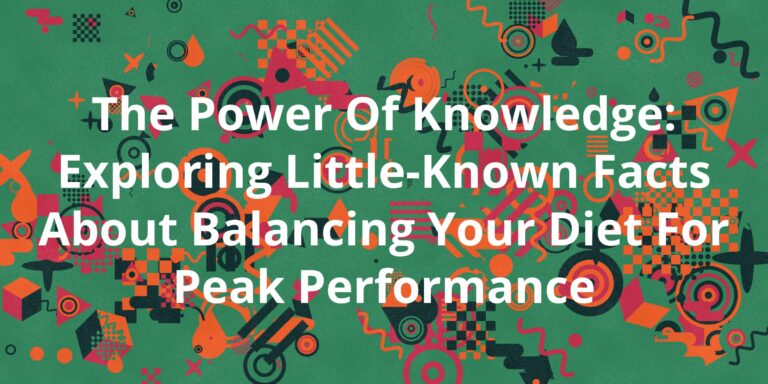Introduction:
The human body is an incredible machine that requires the right fuel to run at its best. Our diet plays a crucial role in our overall health and vitality, as it provides our bodies with the nutrients and energy needed to perform at their peak. In recent years, there has been growing awareness of the importance of balanced nutrition for optimal health. This article will explore the key principles of balanced nutrition, and provide practical tips for incorporating these principles into your daily diet.
Understanding Balanced Nutrition:
Balanced nutrition refers to a diet that provides all the essential nutrients our bodies need to function properly. These nutrients include carbohydrates, proteins, fats, vitamins, and minerals. Each of these nutrients plays a unique role in maintaining good health and preventing disease.
Carbohydrates:
Carbohydrates are the body’s primary source of energy, and they come in many different forms. Simple carbohydrates, such as sugar and refined grains, should be consumed in moderation, as they can cause spikes in blood sugar levels and lead to weight gain. Complex carbohydrates, on the other hand, are found in whole grains, fruits, vegetables, and legumes, and are a healthier option.
Proteins:
Proteins are essential for building and repairing tissues, and they play a critical role in maintaining muscle mass. Good sources of protein include lean meats, fish, eggs, dairy products, beans, and nuts. It’s important to consume enough protein each day to support your body’s needs.
Fats:
Fats are an important source of energy for the body, and they also play a role in maintaining healthy skin and hair. However, it’s important to choose healthy fats, such as those found in avocados, nuts, seeds, and fatty fish, rather than saturated and trans fats, which can increase your risk of heart disease.
Vitamins:
Vitamins are essential for maintaining good health and preventing disease. Each vitamin has its own unique role in the body, and it’s important to consume a variety of foods to ensure that you are getting all the vitamins you need. Good sources of vitamins include fruits, vegetables, whole grains, lean meats, and dairy products.
Minerals:
Minerals are also essential for good health, and they come in many different forms. Some common minerals include calcium, iron, magnesium, potassium, and zinc. It’s important to consume a variety of foods that are rich in minerals to ensure that you are getting all the minerals your body needs.
Practical Tips for Balanced Nutrition:
1. Eat a variety of fruits and vegetables: Fruits and vegetables are rich in vitamins, minerals, and fiber, and they are a great source of complex carbohydrates. Aim to eat a rainbow of colors to get a wide range of nutrients.
2. Choose whole grains: Whole grains are a good source of complex carbohydrates and fiber, and they can help you feel full longer. Choose whole grain bread, pasta, rice, quinoa, and other grains instead of refined grains.
3. Incorporate lean protein: Lean protein sources, such as fish, chicken, turkey, beans, and nuts, are a great source of essential amino acids and can help you build and repair muscle tissue.
4. Limit processed foods: Processed foods are often high in added sugars, salt, and unhealthy fats. Choose fresh, whole foods whenever possible to ensure that you are getting the nutrients your body needs.
5. Stay hydrated: Water is essential for good



